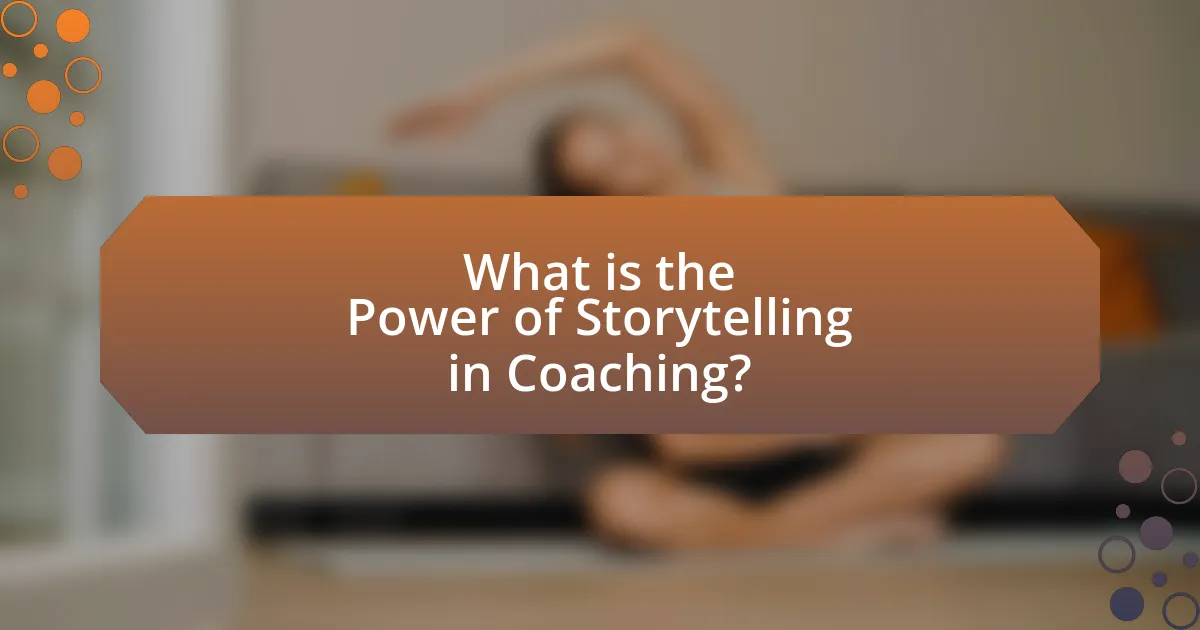The article focuses on the power of storytelling in coaching, emphasizing its role in creating emotional connections and enhancing client engagement. It outlines how storytelling facilitates understanding, retention, and motivation by making concepts relatable and memorable. Key elements of effective storytelling, such as relatability, emotional engagement, and structure, are discussed, along with strategies for coaches to implement storytelling techniques. The article also addresses challenges coaches may face, the importance of cultural considerations, and best practices for integrating storytelling into coaching sessions to foster deeper connections with clients.

What is the Power of Storytelling in Coaching?
The power of storytelling in coaching lies in its ability to create emotional connections and facilitate understanding between the coach and the client. Storytelling engages clients by making concepts relatable and memorable, which enhances their learning and retention. Research indicates that narratives can activate brain regions associated with empathy and emotion, making the coaching experience more impactful. For instance, a study published in the journal “Psychological Science” found that stories can significantly improve information retention compared to traditional methods. This demonstrates that storytelling not only enriches the coaching process but also fosters a deeper level of engagement and insight for clients.
How does storytelling enhance the coaching process?
Storytelling enhances the coaching process by fostering emotional connections and facilitating deeper understanding between the coach and the client. When coaches use stories, they create relatable scenarios that help clients visualize their challenges and aspirations, making abstract concepts more tangible. Research indicates that narratives can improve retention of information and increase engagement; for instance, a study published in the journal “Psychological Science” found that stories are 22 times more memorable than facts alone. This ability to evoke emotions and create a shared experience allows clients to reflect on their own situations, leading to greater self-awareness and motivation for change.
What are the key elements of effective storytelling in coaching?
The key elements of effective storytelling in coaching include relatability, emotional engagement, structure, and clarity. Relatability allows clients to see themselves in the story, fostering a connection that enhances understanding. Emotional engagement captures attention and motivates clients to reflect on their own experiences, making the narrative impactful. A clear structure, typically comprising a beginning, middle, and end, helps convey the message effectively, guiding clients through the learning process. Clarity ensures that the story is easily understood, allowing clients to grasp the lessons being shared. These elements collectively enhance the coaching experience by making it more memorable and transformative.
How does storytelling facilitate emotional connection between coach and client?
Storytelling facilitates emotional connection between coach and client by creating a shared narrative that fosters empathy and understanding. When coaches share personal stories or relevant anecdotes, they humanize themselves, making it easier for clients to relate to their experiences. This relatability enhances trust, as clients feel understood and validated in their own struggles. Research indicates that narratives activate emotional responses in listeners, which can lead to stronger interpersonal bonds. For instance, a study published in the journal “Psychological Science” found that storytelling can increase feelings of closeness and connection among individuals, reinforcing the idea that shared stories can bridge emotional gaps in coaching relationships.
Why is storytelling important for client engagement?
Storytelling is important for client engagement because it creates emotional connections that enhance understanding and retention of information. When coaches use storytelling, they can illustrate concepts and experiences in a relatable manner, making the content more memorable. Research indicates that narratives activate different areas of the brain, leading to increased empathy and engagement; for instance, a study published in the journal “Cognitive Science” found that stories can improve information retention by up to 22 times compared to facts alone. This ability to connect on an emotional level fosters trust and encourages clients to open up, ultimately leading to more effective coaching outcomes.
How does storytelling influence client motivation and commitment?
Storytelling significantly enhances client motivation and commitment by creating emotional connections and fostering relatability. When clients hear stories that resonate with their experiences or aspirations, they are more likely to engage deeply with the content and feel inspired to take action. Research indicates that narratives activate brain regions associated with emotions and empathy, making the information more memorable and impactful. For instance, a study published in the journal “Psychological Science” found that stories can increase information retention by up to 22 times compared to facts alone. This emotional engagement leads to a stronger commitment to goals and a higher likelihood of following through on actions, as clients feel personally invested in the narrative shared with them.
What role does storytelling play in building trust in the coaching relationship?
Storytelling plays a crucial role in building trust in the coaching relationship by fostering emotional connections and enhancing relatability. When coaches share personal stories or relevant anecdotes, they create a safe space for clients to open up, which encourages vulnerability and honesty. Research indicates that narratives can significantly increase empathy and understanding, as demonstrated in a study published in the journal “Psychological Science,” where participants who engaged with stories showed greater emotional resonance and trust towards the storyteller. This emotional engagement is essential in coaching, as it helps clients feel understood and supported, ultimately strengthening the coaching alliance.

How can coaches effectively use storytelling techniques?
Coaches can effectively use storytelling techniques by crafting relatable narratives that resonate with their clients’ experiences and aspirations. By sharing personal anecdotes or client success stories, coaches create emotional connections that enhance engagement and understanding. Research indicates that storytelling can improve retention of information by up to 65%, making it a powerful tool for conveying lessons and insights. Furthermore, stories can illustrate complex concepts in a simplified manner, allowing clients to visualize their goals and challenges more clearly. This method not only fosters a deeper connection but also encourages clients to reflect on their own journeys, facilitating personal growth and development.
What types of stories are most impactful in coaching?
Personal transformation stories are the most impactful in coaching. These narratives illustrate significant changes in individuals’ lives, showcasing their struggles, breakthroughs, and growth. Research indicates that stories of overcoming adversity resonate deeply with clients, as they provide relatable experiences and inspire hope. For example, a study published in the Journal of Applied Psychology found that storytelling can enhance emotional engagement and motivation, leading to improved coaching outcomes. By sharing personal transformation stories, coaches can foster a strong connection with clients, making the coaching process more effective.
How can personal anecdotes enhance the coaching experience?
Personal anecdotes can enhance the coaching experience by fostering a deeper emotional connection between the coach and the client. When coaches share relevant personal stories, they create a relatable context that helps clients feel understood and less isolated in their challenges. Research indicates that storytelling can activate the brain’s mirror neurons, which facilitate empathy and connection, making clients more receptive to guidance. Additionally, anecdotes can illustrate key concepts or strategies in a tangible way, allowing clients to visualize their application in real-life situations. This method not only aids in retention of information but also encourages clients to open up about their own experiences, leading to a more productive coaching dialogue.
What are the benefits of using client success stories in coaching sessions?
Using client success stories in coaching sessions enhances engagement and relatability, allowing clients to see tangible outcomes from similar situations. These narratives provide real-life examples that illustrate the effectiveness of coaching strategies, fostering trust and motivation among clients. Research indicates that storytelling can improve retention of information by up to 65%, making it a powerful tool for reinforcing concepts discussed during sessions. Furthermore, success stories can inspire clients to envision their own potential achievements, thereby increasing their commitment to the coaching process.
How can coaches structure their stories for maximum impact?
Coaches can structure their stories for maximum impact by following a clear narrative arc that includes a relatable protagonist, a conflict or challenge, and a resolution that conveys a meaningful lesson. This structure engages clients emotionally and helps them connect with the story on a personal level. Research indicates that stories with a strong emotional component are more memorable; for instance, a study published in the journal “Cognitive Science” found that narratives can enhance retention of information by up to 22 times compared to facts alone. By incorporating elements such as vivid imagery and personal anecdotes, coaches can further enhance the relatability and effectiveness of their storytelling, ultimately fostering deeper connections with their clients.
What narrative techniques can coaches employ to engage clients?
Coaches can employ narrative techniques such as personal storytelling, metaphor usage, and active listening to engage clients effectively. Personal storytelling allows coaches to share relevant experiences that resonate with clients, fostering a sense of connection and relatability. Metaphors can simplify complex concepts, making them more accessible and memorable for clients. Active listening enhances engagement by demonstrating empathy and understanding, encouraging clients to share their own stories and insights. These techniques are supported by research indicating that storytelling can enhance emotional connection and retention of information, making coaching sessions more impactful.
How can the use of metaphors and analogies enhance storytelling in coaching?
The use of metaphors and analogies enhances storytelling in coaching by making complex concepts more relatable and understandable for clients. By translating abstract ideas into familiar imagery, coaches can facilitate deeper comprehension and emotional connection. Research indicates that metaphors can improve retention of information; for instance, a study published in the Journal of Educational Psychology found that students who learned through metaphorical language performed better on tests than those who did not. This suggests that when coaches employ metaphors and analogies, they not only clarify their messages but also engage clients on a cognitive and emotional level, ultimately leading to more effective coaching outcomes.

What challenges do coaches face when using storytelling?
Coaches face several challenges when using storytelling, including the difficulty of crafting relatable narratives, ensuring engagement, and balancing authenticity with the intended message. Crafting relatable narratives requires coaches to understand their audience deeply, which can be challenging if the audience has diverse backgrounds or experiences. Ensuring engagement is critical, as a poorly delivered story can lead to disinterest, undermining the coaching process. Additionally, coaches must balance authenticity with the intended message; if a story feels contrived or insincere, it can damage trust and rapport with clients. These challenges highlight the need for coaches to develop strong storytelling skills to effectively connect with clients.
How can coaches overcome barriers to effective storytelling?
Coaches can overcome barriers to effective storytelling by actively developing their narrative skills and understanding their audience’s needs. By practicing storytelling techniques, such as structuring narratives with a clear beginning, middle, and end, coaches can enhance engagement and retention of their messages. Research indicates that stories are 22 times more memorable than facts alone, highlighting the importance of narrative in communication. Additionally, coaches should seek feedback from clients to refine their storytelling approach, ensuring that the stories resonate and connect on a personal level. This iterative process of practice and feedback fosters a deeper connection with clients, ultimately enhancing the coaching experience.
What common pitfalls should coaches avoid when sharing stories?
Coaches should avoid several common pitfalls when sharing stories, including being overly self-referential, failing to connect the story to the client’s experience, and neglecting the emotional impact of the narrative. Being overly self-referential can alienate clients, as they may feel the focus is more on the coach than on their own journey. Failing to connect the story to the client’s experience can lead to disengagement, as clients may not see the relevance of the narrative to their own challenges. Additionally, neglecting the emotional impact can diminish the story’s effectiveness; research shows that emotionally resonant stories are more likely to foster connection and understanding, which is crucial in a coaching context.
How can cultural differences affect storytelling in coaching?
Cultural differences significantly affect storytelling in coaching by influencing the themes, values, and communication styles that resonate with clients. For instance, individualistic cultures may prioritize personal achievement and self-expression in stories, while collectivist cultures often emphasize community and relational harmony. Research by Hofstede (1980) highlights these cultural dimensions, showing that storytelling approaches must adapt to align with clients’ cultural backgrounds to foster effective connections. This adaptability enhances the coaching relationship, making narratives more relatable and impactful for diverse audiences.
What strategies can coaches implement to improve their storytelling skills?
Coaches can improve their storytelling skills by practicing narrative structure, engaging in active listening, and utilizing personal experiences. Practicing narrative structure involves understanding the components of a compelling story, such as setting, conflict, and resolution, which helps coaches craft more engaging narratives. Engaging in active listening allows coaches to better understand their clients’ experiences and emotions, enabling them to tailor their stories to resonate more deeply. Utilizing personal experiences adds authenticity and relatability to the stories shared, making them more impactful. These strategies are supported by research indicating that effective storytelling enhances emotional connection and retention of information, which is crucial in coaching contexts.
How can practice and feedback enhance a coach’s storytelling ability?
Practice and feedback enhance a coach’s storytelling ability by allowing them to refine their narrative techniques and adapt their stories to better resonate with their audience. Regular practice enables coaches to experiment with different storytelling styles, pacing, and emotional engagement, which can lead to more impactful narratives. Feedback from peers or clients provides critical insights into what elements of the story are effective or need improvement, fostering a cycle of continuous enhancement. Research indicates that storytelling can significantly improve client engagement and retention, highlighting the importance of a coach’s ability to connect through compelling narratives.
What resources are available for coaches to develop their storytelling techniques?
Coaches can develop their storytelling techniques through various resources, including books, online courses, workshops, and podcasts. Notable books such as “The Story Factor” by Annette Simmons and “Made to Stick” by Chip Heath and Dan Heath provide foundational insights into effective storytelling. Online platforms like Coursera and Udemy offer courses specifically focused on storytelling skills, often taught by industry experts. Additionally, workshops conducted by organizations like the Moth and storytelling festivals provide practical, hands-on experience. Podcasts such as “The Moth” and “StoryCorps” also serve as valuable resources, showcasing real-life storytelling examples that coaches can analyze and learn from.
What are the best practices for integrating storytelling into coaching sessions?
The best practices for integrating storytelling into coaching sessions include using personal anecdotes, aligning stories with client goals, and encouraging clients to share their own narratives. Personal anecdotes help establish rapport and trust, making the coaching environment more relatable. Aligning stories with client goals ensures that the narrative is relevant and reinforces the lessons being taught. Encouraging clients to share their own stories fosters self-reflection and deeper engagement, which can lead to more meaningful insights and breakthroughs. These practices are supported by research indicating that storytelling enhances memory retention and emotional connection, making the coaching process more effective.
How can coaches assess the effectiveness of storytelling in their practice?
Coaches can assess the effectiveness of storytelling in their practice by evaluating client engagement and feedback during sessions. This can be measured through direct client responses, such as verbal affirmations or follow-up discussions that indicate understanding and connection to the story shared. Research shows that storytelling enhances emotional resonance, which can be quantified through client surveys that gauge emotional responses and perceived relevance of the stories to their personal experiences. Additionally, tracking client progress and outcomes after storytelling sessions can provide concrete evidence of its impact, as studies indicate that narratives can significantly influence behavior change and motivation in coaching contexts.
What tips can coaches follow to ensure their stories resonate with clients?
Coaches can ensure their stories resonate with clients by personalizing narratives to reflect clients’ experiences and emotions. Tailoring stories to align with clients’ challenges fosters relatability and connection, making the message more impactful. Research indicates that storytelling enhances memory retention and emotional engagement, which is crucial in coaching contexts. For instance, a study published in the Journal of Business Communication found that stories significantly improve audience engagement and understanding, demonstrating the effectiveness of this approach in professional settings.
